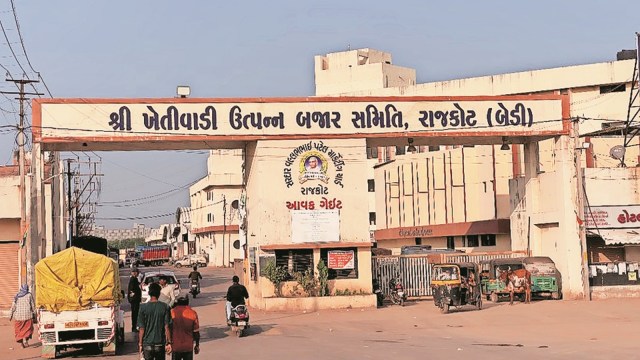Gujarat traders boycott auction against ‘arrival of Chinese origin garlic’
The strike by commission agents in Gujarat comes three days after they refused to participate in the auction of 30 bags of garlic in Gondal APMC mandi on Friday.
 Gujarat APMC (Express)
Gujarat APMC (Express)Alleging that prohibited garlic of Chinese origin has started arriving in wholesale markets of the state, commission agents of Agricultural Produce Market Committee (APMC) mandis in Gujarat boycotted auction of the commodity on Tuesday across the state and demanded that the government take measures to protect interests of Indian farmers.
Commission agents didn’t take part in the auction of garlic in APMC mandi in Rajkot’s Gondal, the state’s biggest wholesale market for this commodity. Agents in Rajkot APMC, the second largest market in terms of volume, also joined the strike.
“Price of garlic has risen for the first time in about five years and has gone past Rs 200 per kg in the wholesale market as production has decreased due to farmers switching to other crops. Before that, market prices of garlic had dropped to Rs 5 per kilogram (kg), making the crop unviable for farmers. Now that the prices have become remunerative for farmers, garlic of Chinese origin has started arriving in the market. This will cause a collapse in market prices and hurt Indian farmers.
Therefore, we have boycotted the auction as a mark of protest against this influx,” Yogesh Kyada, president of Gondal APMC Commission Agents Association, said.
 The shed housing garlic bags wears a deserted look. (Express Photo)
The shed housing garlic bags wears a deserted look. (Express Photo)
“Chinese garlic is making its way to Gujarat and other centres of India via Afghanistan. We request the government to keep an eye on this and arrest those involved,” Atul Kamani, a leader of commission agents in Rajkot APMC said, adding commission agents of Gujarat had extended their support to the nation-wide strike over this issue Tuesday.
The strike by commission agents in Gujarat comes three days after they refused to participate in the auction of 30 bags of garlic in Gondal APMC mandi on Friday.
“Traders suspected that the bags contained garlic of Chinese origin and refused to purchase it through auction,” Tarun Pachani, secretary of Gondal APMC said, adding, “We had informed police and officers of the agriculture department of Gujarat about this.”
Jaipal Singh Rathore, deputy inspector general of Rajkot Rural police, said that they had registered a non-cognisable offence in this regard after Praful Chaniyara, a commission agent at Gondal APMC mandi, submitted a complaint. “We have seized the 30 bags of garlic suspected to be of Chinese origin and are trying to find out its source. We have sent its samples to a laboratory of Junagadh Agricultural University as well as to a Central government laboratory for analysis,” he said.
Mukesh Satasiya, a former president of GACAA, said that the garlic variety grown in China is similar to the one grown in Himachal Pradesh. “Both have large bulbs and the size of bulblets or cloves can be as large as a thumb. They have pinkish skin. However, Chinese garlic bulbs are shipped after clearing their roots and proper cleaning. We don’t find these features in Indian crops that come to market,” Satasiya said. “The traditional variety grown in large parts of India, including in Gujarat, has cloves of much smaller size with white skin. The variety grown in India has a strong pungent taste, something lacking in the crop grown in China,” he added.
JP Gosai, police inspector in-charge of ‘B’ Division police station in Gondal where the complaint was lodged, said the 30 bags were brought to Gondal APMC mandi by one Arafat alias Altaf, a trader of Upleta town in Rajkot.
“In his statement, Altaf told us that a trader from Mumbai had sent him the consignment. In turn, the Mumbai trader claims that the consignment is of a garlic, which was grown in Himachal Pradesh,” he said.
Import of garlic from China has remained prohibited since 2005 due to repeated interceptions of Embellisia allii (dry rot of garlic) fungus and Urocystis cepulae (onion smut) in consignment of garlic imported from China, according to a government advisory.
Embellisia alliin d Urocystis cepulae are exotic pathogens afflicting garlic and the import from China was prohibited to safeguard the plant biosecurity of the nation, the advisory stated.







